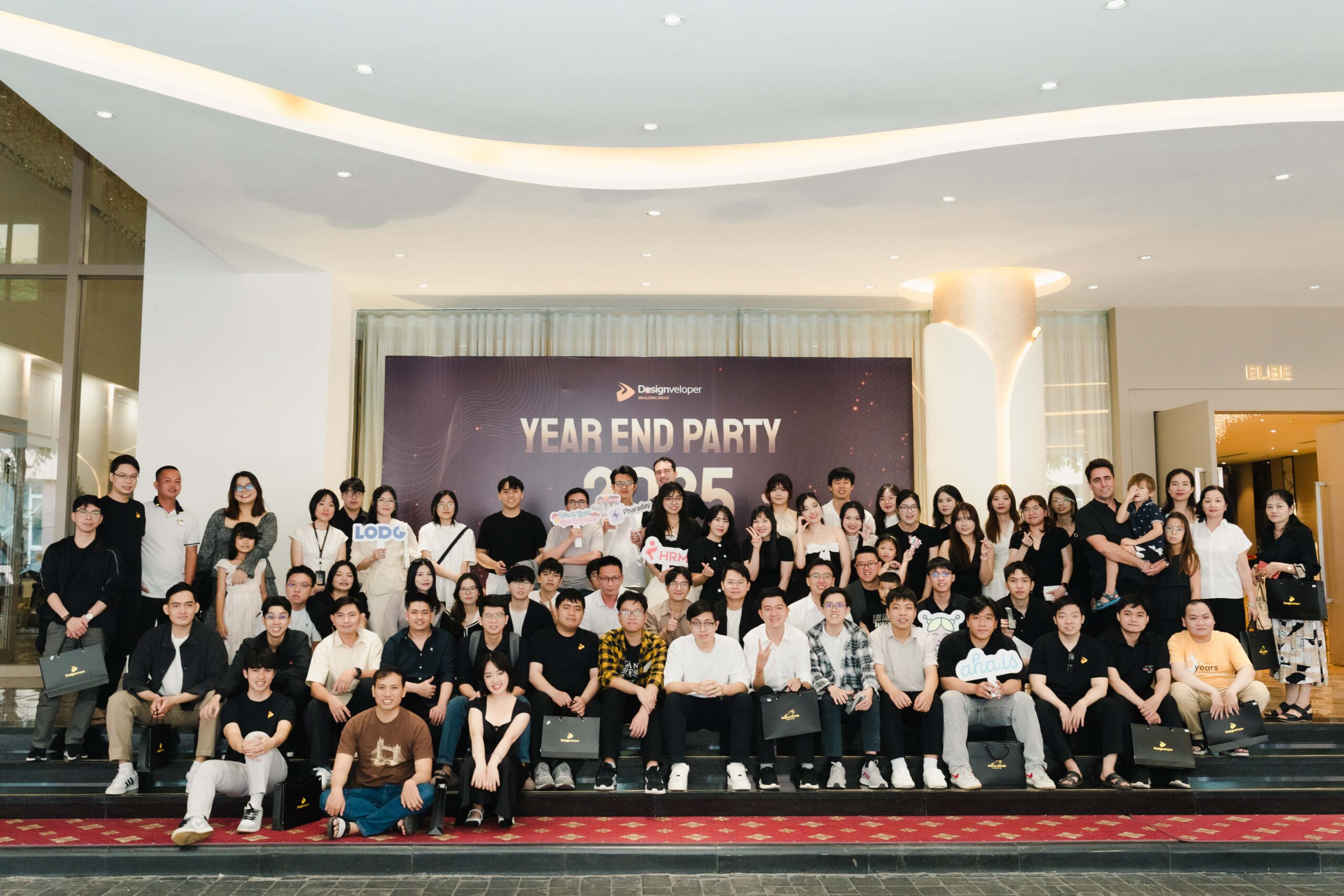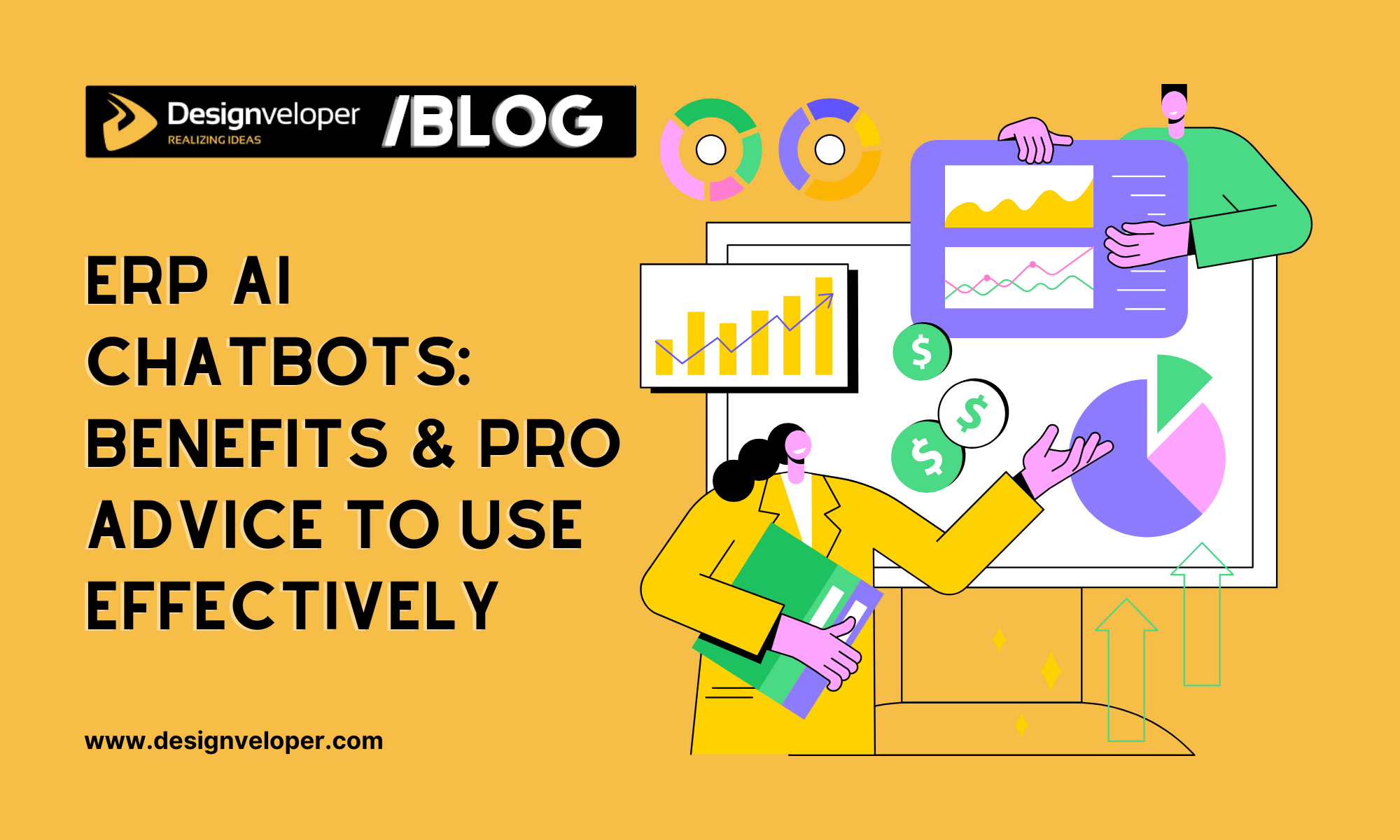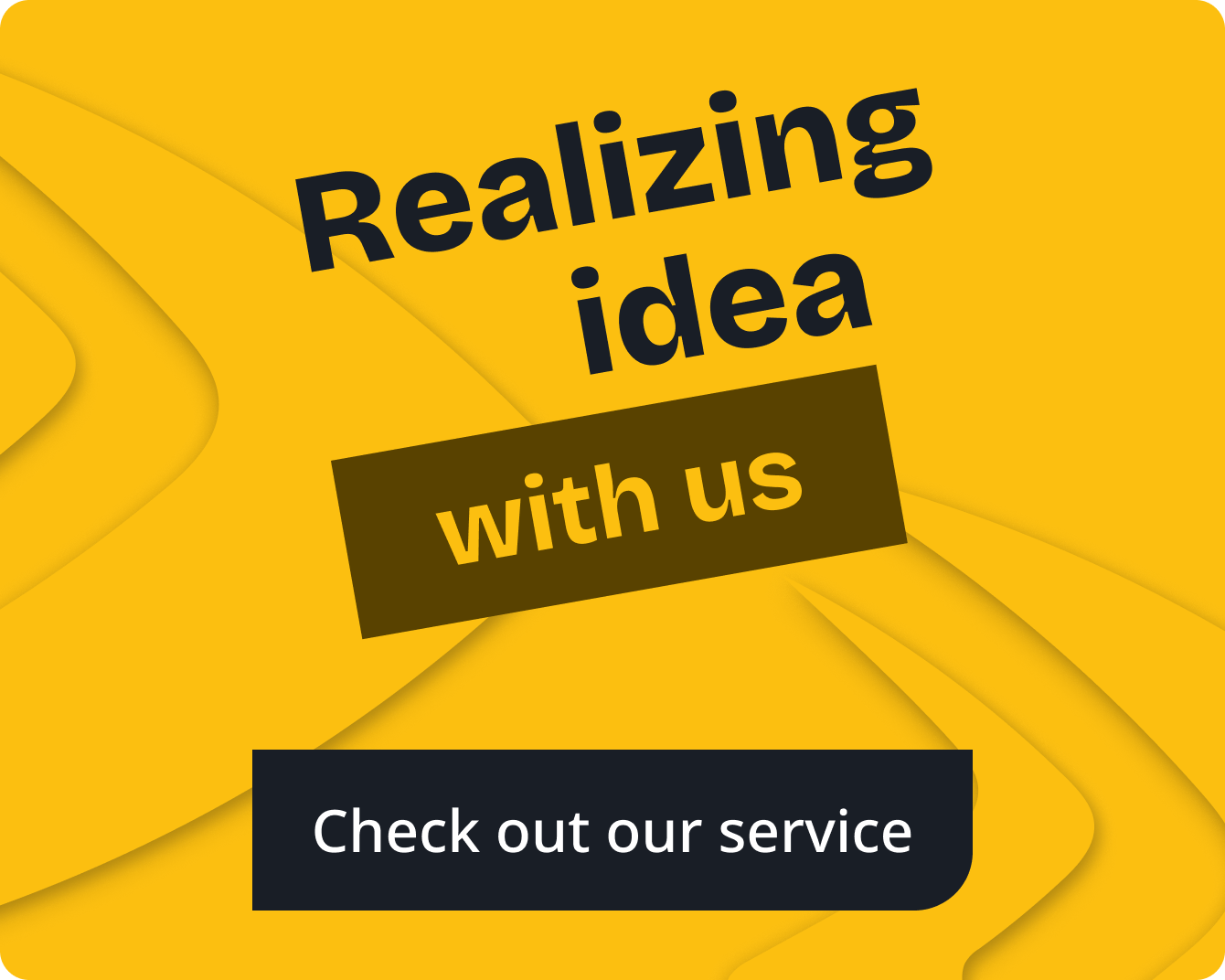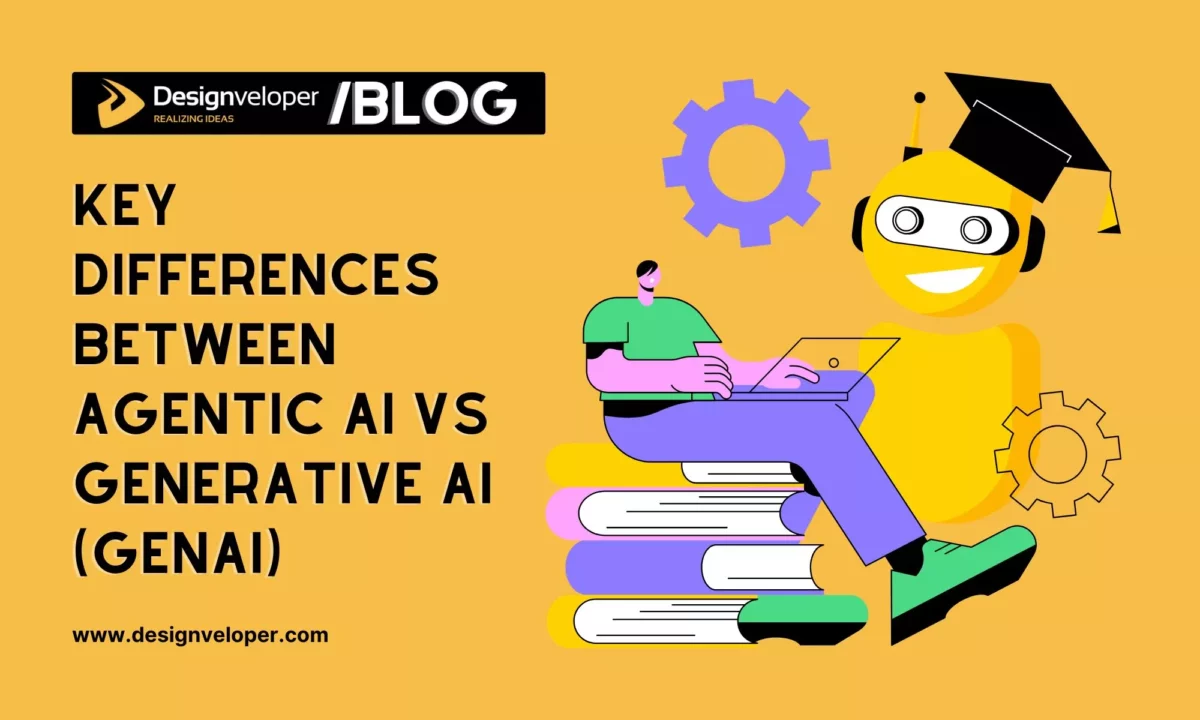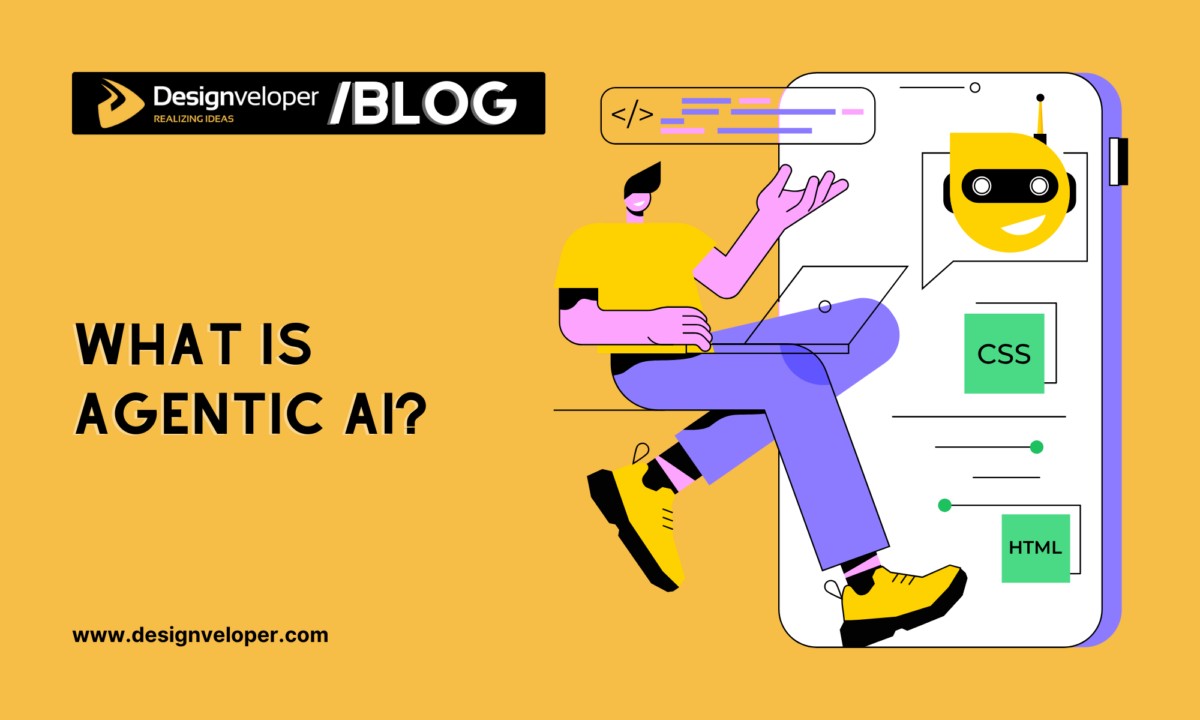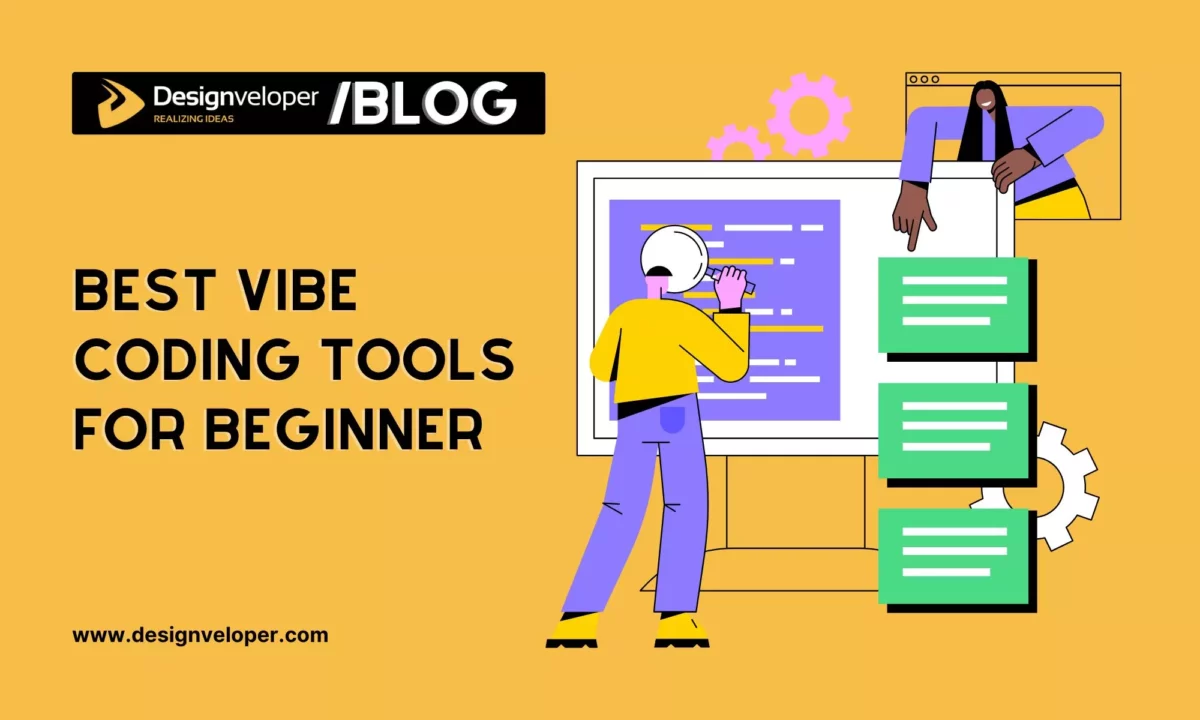
Feel tired of sifting through countless ERP menus to find a supplier’s invoice details or a customer’s order history? You’re not alone. Traditional ERP systems are powerful yet come with several bottlenecks, like time-wasting data retrieval or limited self-service. This hinders your business from automating core operations effectively. That’s why, when AI has thrived and gradually invaded our world, it’s also been integrated into ERP systems to turn them into smart, interactive partners. So, what are ERP AI chatbots, exactly? Why should your business employ them, and what do you need to consider to make the most use of these bots? Let’s figure out the answers in this article with Designveloper!
What is an ERP AI Chatbot?
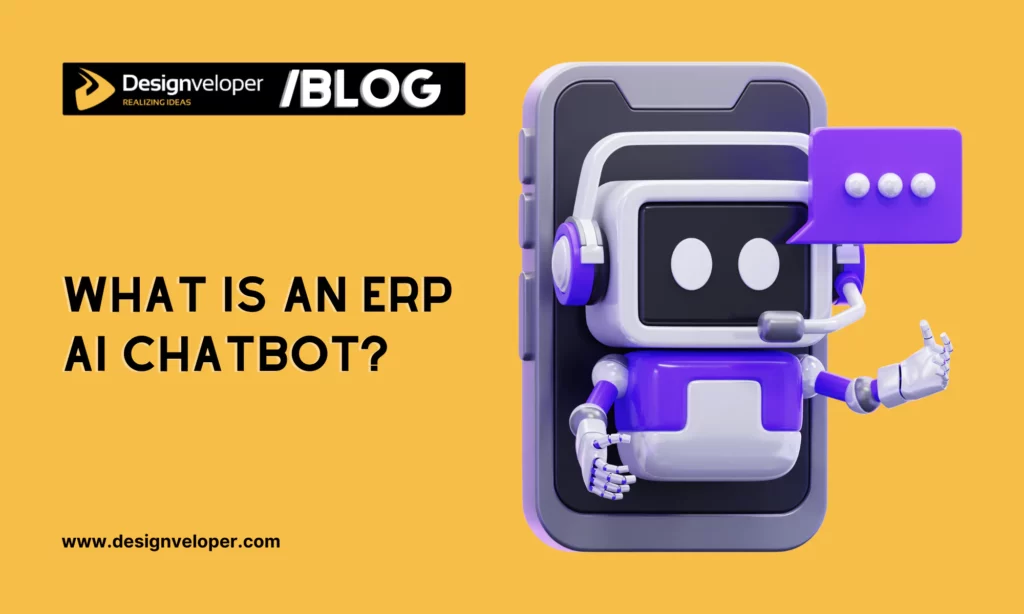
To understand what an ERP AI chatbot is, let’s break this term down into individual components: ERP and AI Chatbot.
What is ERP (Enterprise Resource Planning)?
Simply speaking, an ERP system is a software solution that controls all your core business processes, from finance & accounting and human resources to supply chain and sales.
Instead of having separate software for each department, your business will bring core activities together in one place. This creates seamless communication and data exchanges between departments, supporting better decision-making and increasing productivity. Further, an ERP system gives the management board a comprehensive view of enterprise-wide operations.
What is an AI Chatbot?
An AI chatbot is a computer program that creates human-like conversations with users. It leverages advanced AI technologies, including Natural Language Processing (NLP), to understand text or spoken queries and give human-like, relevant responses. The chatbot does not simply recognize each word in your input requests, but it also deciphers the meaning and purpose behind your sentences.
Suppose you ask: “What are the April sales of product X compared to the past two months?”. The chatbot will interpret the underlying purpose of your query and dive into sales data. It then returns not only the April sales figure but also compares sales data between months.
What is an ERP AI Chatbot, and Its Difference from Traditional ERP Systems?
An ERP AI chatbot is an intelligent conversational interface using AI capabilities to interact with your company’s ERP system. Traditional ERP systems normally require you to click through various graphical user interfaces (GUIs) with menus, forms, and reports to execute certain tasks (e.g., data retrieval).
But with AI integration, these systems will offer a smart way to access data and streamline workflows. There’s no need to navigate through various screens. Instead, you just need to ask the AI chatbot questions like “What is the stock level of product X across all stores?” or require it to “Create a purchase order for vendor Y.” From simple to complex queries, AI can get you covered. Several advanced ERP AI chatbots can forecast future demands (e.g., inventory levels) based on historical and real-time data and external factors (e.g., seasonality).
Why Should You Integrate AI Chatbots into Your ERP Systems?
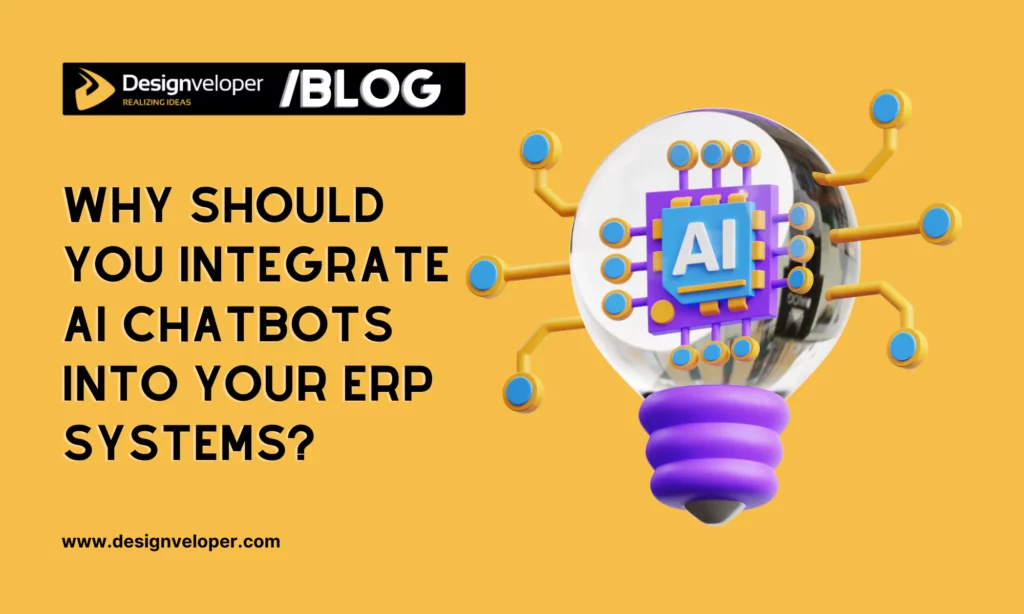
As your company’s central nervous system, ERP has very large volumes of data with different layers of menus and a multitude of reports. Therefore, navigating around traditional ERP systems to retrieve necessary data is not only time-wasting and challenging but also causes users to make mistakes (i.e., building erroneous reports). Especially for those unfamiliar with the ERP system’s complexity or executing interdisciplinary tasks, using traditional ERP systems will be a nightmare.
But the integration of AI technologies has transformed how your ERP systems operate. According to one research, the global market of AI integration in ERP systems will reach $7.2 billion in 2025, which continues to increase significantly in the next decade. Using plain language, you can ask AI to:
- Automate routine tasks (e.g., data entry, report generation, or invoice processing).
- Access, retrieve, and summarize crucial information more quickly and precisely.
- Identify patterns, trends, and anomalies within ERP data through AI-powered analysis.
- Proactively send alerts about particular events (e.g., low inventory levels, possible disruptions in the supply chain) when predefined thresholds are met.
- Provide proper recommendations (e.g., suggesting optimal reorder points) to improve operational efficiency and productivity.
With these capabilities, AI chatbots have a wide application in ERP management. For example, they can manage the supply chain by checking inventory levels, placing orders, or alerting to late shipments. Further, the chatbots can automate HR requests, process expense claims, answer benefits-related questions, and track leaves.
FURTHER READING: |
1. What is Voice Technology? Definition and Examples |
2. 20 Open Source Chatbot Frameworks to Use in 2026 |
3. ChatGPT: Everything About the Hottest AI Chatbot in Tech |
5 Successful Case Studies of Using ERP AI Chatbots
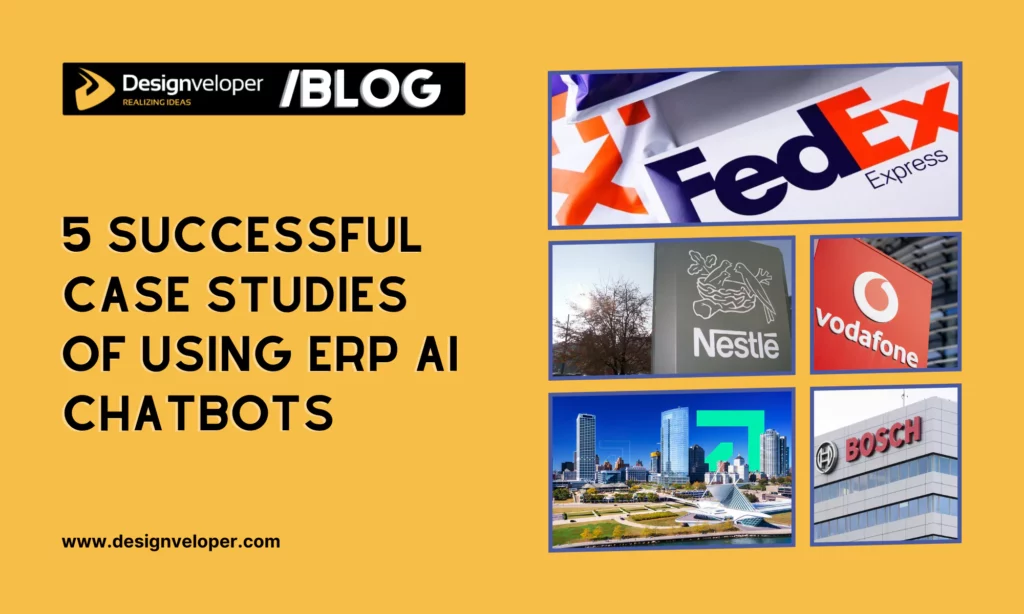
You’ve understood what an ERP AI chatbot is and what it can do to enhance your core business workflows. Now, let’s take a quick look at how companies worldwide leverage AI chatbots to reinforce their ERP systems and internal processes:
1. FedEx
FedEx is globally known for using technology to enhance shipments and offer customers detailed information about their packages. The company wants to adopt this innovative approach to its back-office operations, primarily focusing on finance and supply chain. To pursue this mission, FedEx decided to execute a large-scale movement to the cloud.
Solution: FedEx chose Oracle’s suite of applications, like Oracle Cloud ERP, EPM, SCM, and Analytics, to support both organic and acquired growth. By embracing AI and advanced analytics, FedEx can run complex analyses on its costs to improve finance management. Besides, Oracle Cloud helps FedEx update what’s going on globally, hence adjusting networks and redistributing capacity based on real-time demands.
Success: Using Oracle’s suite of applications helps FedEx automate various internal processes and inform decision-making.
2. Nestle
Nestle is a world-famous food and beverage brand. In 2021, the company encountered challenges with mergers and acquisitions because of its incompatible ERP system. That’s why Nestle’s M&A and Enterprise Integrations teams strived to find a flexible solution that allows them to create reusable configurations to adapt to its different business models and geographical operations.
Solution: Working with KPMG, Nestle built “Seed.” This framework uses Dynamics 365 as a foundational platform due to its agile implementation and modular design. These capabilities can fulfill speedy and flexible business system requests for M&A activities. Accordingly, the company migrated business data and operations from its existing on-premises system to Dynamics 365 products and services, including Finance, Commerce, and Supply Chain Management. Accordingly, the company migrated business data and operations from its existing on-premises system to Dynamics 365 products and services, including Finance, Commerce, and Supply Chain Management. To streamline similar migrations or optimize existing deployments, many organizations hire a dynamics CRM consultant to configure modules and ensure smooth adoption.
Success: Thanks to built-in features and automation in Dynamics 365, Nestle successfully completed its project of buying back Nespresso distribution rights in the Kingdom of Saudi Arabia (KSA) in 2021. The platform helped them remove paperwork and make employees more productive in value-added tasks to enhance customer service and profitability.
Ongoing Expansion: With the success in 2021, Nestle continued to improve its customer experience and relationship management. In 2023, it deployed Microsoft’s products powered by AI and Copilot to achieve this goal, like Dynamics 365 Customer Service, Power BI (for advanced analytics), or Marketing (for real-time customer insights).
3. Vodafone
Vodafone’s Finance Operations department struggled with managing training employees on a massive volume of complex policies related to accounting and keeping them constantly updated with policy changes.
Solution: Vodafone combined a Retrieval Augmented Generation (RAG) application and Generative AI on SAP BTP to create an ERP AI chatbot known as Finance Advocate. Trained on the latest policy, training documents, and processes, the AI chatbot can handle different queries from simple principle-based questions to complex scenario-based ones.
Success: The Finance Advocate tool has the ability to offer 24/7 and instant responses. This allows accountants to take proper actions immediately and saves the global support team hours in handling tickets. The tool can improve its generated responses by being fed with internal notes from previous queries. Also, it can seamlessly support the onboarding of new employees and reduce training costs.
4. Gainwell
Gainwell Technologies is a US-based solution provider for human services and public health systems. In 2021, Gainwell increased its labor force from 7,000 employees to 13,000. So, the company was looking for a solution to improve its existing HR process.
Solution: Gainwell used AI capabilities in SAP Success Factors, a human capital management (HCM) suite, to reduce costs, boost productivity, and support the growing workforce. Accordingly, the company rolled the Joule feature (SAP’s AI chatbot) across the organization to help employees get information faster.
Success: The suite helped save time, improve work output, and support employees and leaders in a more productive way.
5. Bosch
Bosch’s service teams at Bosch Power Tools have to process millions of tickets (that are formal records of requests or issues) every year. Previously, they leveraged countless static rules to route these tickets to the right agent. But this approach proved complicated and frustrating to everyone.
Solution: Bosch, therefore, invested in SAP S/4HANA integrated with the Joule Copilot to resolve this problem. Accordingly, AI would analyze the context behind each ticket and automatically direct the ticket to the right team.
Success: This investment eliminated hundreds of workflow rules while considerably increasing first-touch accuracy. The new approach offers faster responses, better first-time resolution, and consistent service quality, consequently making Bosch’s service operations more effective. It can even scale up seamlessly when new products and services are introduced. This saves thousands of work hours annually and reduces costs.
Key Considerations When Using an ERP AI Chatbot
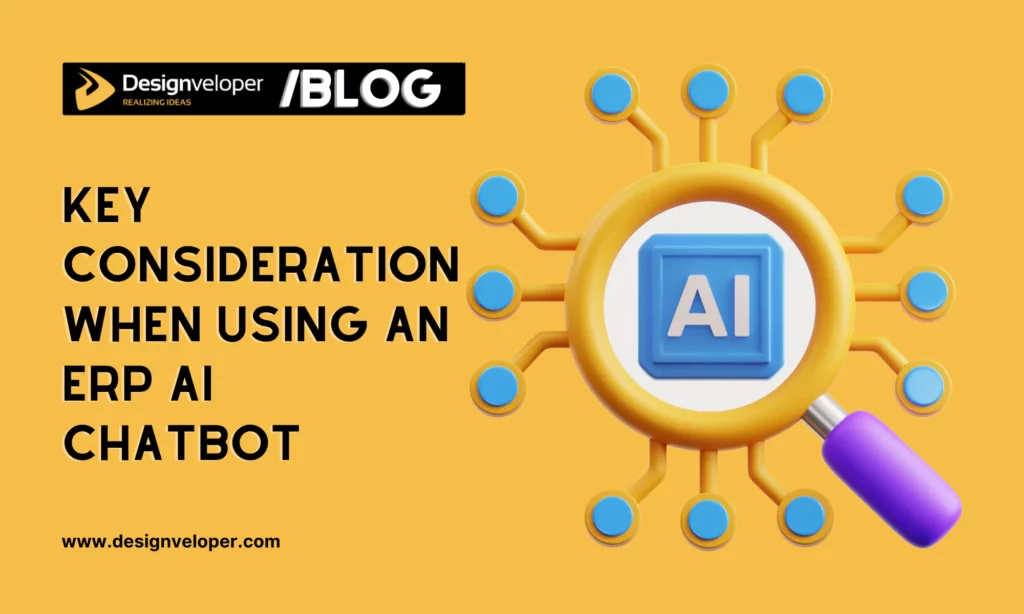
The diverse applications and successful case studies of ERP AI chatbots gave you a better understanding of their significant benefits. But it doesn’t mean these chatbots have no limitations. So, when using ERP AI chatbots, you’re often advised to take the following considerations to overcome their possible challenges:
- Data security and privacy: ERP AI chatbots often deal with sensitive business data. So, your company should focus on strong security measures (like data encryption, user authentication, or access control) to control which data the chatbot can access and which actions it can take within your ERP system. This not only protects your data in transit and at rest but also ensures compliance with regulations (e.g., GDPR, CCPA).
- Integration: To make full use of AI chatbots, you need to integrate them with your company’s legacy ERP system seamlessly. For seamless integration, they need to provide robust APIs to communicate efficiently with your ERP’s APIs, interpret different data types within your ERP system, and retrieve live data seamlessly.
- Customization: AI chatbots need to be customizable to fit the unique business demands of your ERP system.
- Scalability: ERP AI chatbots need to be scalable to ensure their long-term feasibility and cost-effectiveness. So, when you choose an AI solution for the existing ERP system, consider whether it’s easy to maintain and scale the chatbot without compromising performance. Further, you need to consider whether there are hidden costs related to scalability.
These challenges are often visible when you develop and integrate AI chatbots into your legacy ERP systems. However, they’re alleviated if you leverage reputable ERP systems already integrated with AI chatbots, like SAP, Oracle, IFS, or Acumatica. These systems come with strong security frameworks, data governance policies, and native integration of AI chatbots. Further, the entire system can scale up or down based on your evolving business demands.
How Can Designveloper Help You Build or Integrate Custom AI Chatbots to ERP?
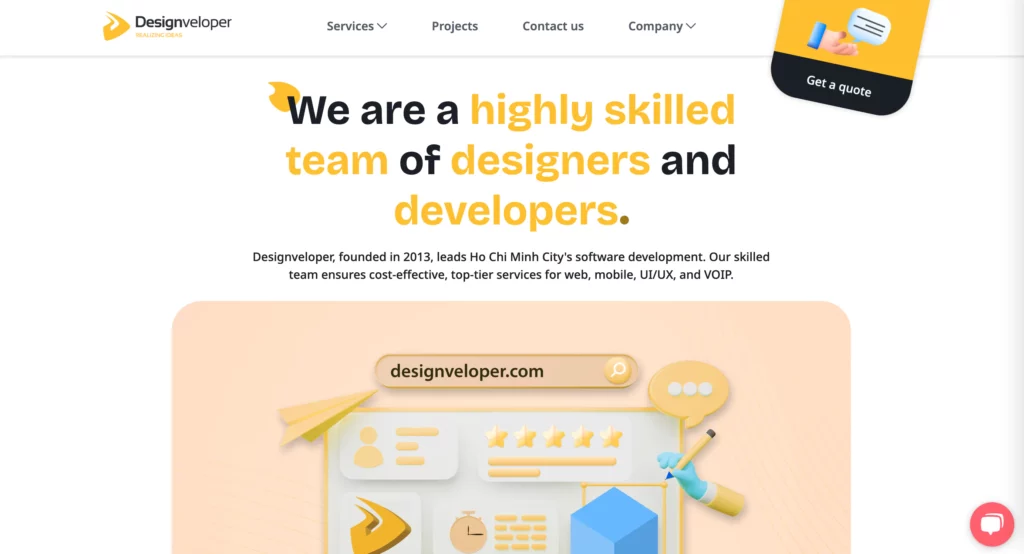
So, do you want to develop a custom, scalable AI chatbot for your unique demands and integrate it seamlessly into your ERP infrastructure? If so, Designveloper is here to help. Here’s what we can offer you:
Custom development services
With 12 years of experience, we’ve provided top-notch AI development services to create innovative solutions with on-time and cost-effective delivery. With our highly skilled developers, you can leverage advanced AI technologies and algorithms to streamline your business functions, from accounting and HR management to customer service and supply chain.
Seamless integration
We offer excellent AI chatbot integration services to enhance your existing platforms, improve productivity, and foster interdisciplinary collaboration. The chatbot can scale seamlessly with your evolving demands.
Best security measures
We leverage the best security measures to ensure secure data exchanges and usage between the AI chatbot and your ERP system. Further, the custom chatbot works in compliance with data privacy regulations.
Maintenance and support
We keep your ERP AI chatbot updated and away from defects with ongoing technical support. This service ensures your ERP AI chatbot always works seamlessly with your business demands.
Conclusion: The Future of ERP & AI Chatbots
Right after this article, we hope you’ll have a comprehensive overview of what ERP AI chatbots are and how they can help streamline your core business functions. With their significant benefits, AI chatbots will be increasingly applied to ERP systems across industries. Further, technical advancements in AI, like deep learning, make the chatbots smarter and work more effectively. So, what do you think about ERP AI chatbots? Share your idea with us on Facebook, X, and LinkedIn!






Read more topics
You may also like



















